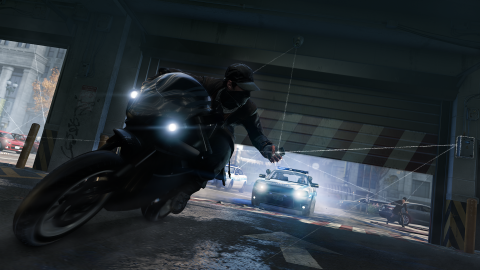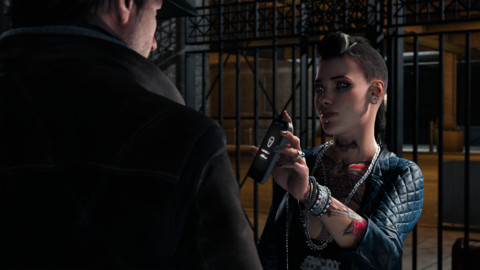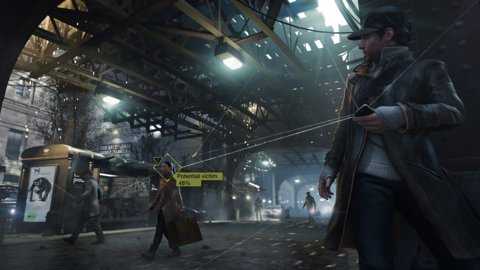
For better or worse, Watch Dogs has been propped up by many as one of the new generation of consoles' first "big" games. But instead of feeling like the future, Watch Dogs reminds me of the past. I'm reminded of the time when developers were ardently chasing after that Grand Theft Auto gold, resulting in a menagerie of takes on the GTA formula, each with their own little hook. Some worked out really well, others floundered and vanished. Watch Dogs' spin on the genre gives you limited control over some of the city's features, letting you toggle the state of various objects both on foot or in a vehicle. For the most part, these interactions are there to eliminate or block your enemies so you have more time to escape. Even with that as one of its unique twists on the genre, Watch Dogs is little clunky in spots and it starts very slowly. Luckily, that bad first impression lets up as you get into more interesting missions and become more comfortable with the game's abilities and options.
In a lot of ways, Watch Dogs falls into the same routine as most other mission-based open-world games. There's a main narrative of missions that progress in order, with side missions that back them up and give you a little something to do if you're looking for a change. The mission design is really standard for this sort of game--you'll hunt people down and shoot them, you'll get away from the cops, and the missions where you're asked to tail someone discreetly continue to suck. I don't necessarily view all this as a bad thing, but at this point in life you've probably already determined whether or not you like this sort of game. Not to get overly reflexive on you, but if you have the hunger for this type of open-world game, it's a solid entry. The things designed to set Watch Dogs apart, though, don't make that big of an impact.
The first differentiator is that you're a hacker set loose in a city that's been overrun by surveillance and connected "smart" technologies that are designed to make life easier (while simultaneously setting up the game's slightly hamfisted approach to the issues of government surveillance and the potential nightmares that come from relying on one big system with a single point of failure). For the most part, this boils down to pushing the square button to incapacitate police cars. Sometimes that square button raises blockers out of the street, sometimes it causes steam pipes to explode, but generally, you're waiting for a "neutralize" prompt to appear on-screen while you're driving, indicating that you're a button press away from having one less hassle on your tail. You also use that square button (X on the Xbox, naturally) to hack the planet.

When pressed, that square button sends you into profiler mode, allowing you to view names and details of any of the game's NPCs. Some of them have bank accounts you can hack, letting you get access to funds that are useful for buying a few weapons, but generally useless unless you're into cosmetic stuff like costumes or unlocking additional cars. Others have songs you can hack out of their phones, adding them to the game's disjointed and disappointing playlist. You hit this button when you walk up to terminals or see junction boxes on the street, and you can also use it to tap into security camera feeds. It's a one-size-fits-all approach to hacking, which makes the way the game occasionally and arbitrarily sticks in a dull hacking minigame feel that much more puzzling. A big part of the game involves hacking into a camera, then using that to hack into another camera, and so on and so on until you get to an otherwise-unreachable hacking point. You can also tag enemies with the profiler or security cameras, letting you see silhouettes behind walls and setting up the game's various stealth takedowns.
Interestingly, the game has no "real" melee combat system. Rather than giving you a punch button, the game simply has a takedown button, and it works whether you're sneaking up from behind or running up in plain sight. You also have weapons, including a perfectly accurate and silenced pistol that, except in cases where you're severely outnumbered and forced into open combat, makes most of the combat and stealth situations feel completely trivial, assuming you're even slightly skilled at lining up headshots. When taking on scads of enemies, the assault rifles work just fine and, as long as you patiently use cover and don't expose yourself for too long, the combat is quite easy.
The other thing that sets Watch Dogs apart from the typical open-world game is the way its online action is structured. While it still has the same boring online race mode that every open-world game seems to have these days (does anyone actually still want to engage in an open-world race in a game that wasn't built for racing?), it also has a handful of cat-and-mouse-like modes where one player has to get close to another player to steal something from them. These online invasions pop up against your will, forcing you to deal with another player before you can proceed. The rewards for succeeding in this mode are minimal and they seem to always pop up when you're trying to start another mission, making them feel like a hassle that's preventing you from doing the thing you actually want to be doing. It seems like a bad implementation of a decent idea. If you like, you can disable the online invasion aspect of the game, but doing so prevents you from earning a handful of bonus perks, like making your bullets do more damage to vehicles. Disabling invasions mid-game actually resets any online points you've earned back to zero, too. This would be a little more outrageous if the perks you got for playing online were of any real value, but many of them pertain solely to the multiplayer mode that you're trying to avoid and the game is already quite easy, so it's not that big of a deal. There are a handful of different modes that you can engage from a separate menu, and the game will constantly remind you that various online opportunities exist via the same system it uses to notify you about nearby side missions.

The story puts you in the shoes of a thief-turned-vigilante who sees the light in the game's opening moments, after a cyber-caper goes cyber-sideways resulting in some decidedly non-cyber-retaliation that ends with your all-the-way-not-cyber niece dead. Watch Dogs is a revenge tale, as Aiden Pearce attempts to find out who ordered the hit on him that left his niece dead while also hooking up with some other shady hackers and fighting crime. With his gruff voice and serious demeanor, you almost half-expect a mid-game twist where Pearce just shouts "I'm cyber-Batman." Instead, he's out there using his real name--which, considering most of the game's other hackers appear with embarrassing monikers like Badboy17 or Defalt, might be the smartest thing Pearce does in the entire game. Or maybe "Aiden Pearce" is just as embarrassing of a name. Anyway, the story is all over the place and is full of characters that sort of cruise into and out of the story, which makes it hard to care about any of them. Also, the main missions have huge sidetracks that occasionally feel like they came from another game--a couple of times I completely forgot why I was even doing what I was doing and how my current mission tied into the overall picture of getting revenge for my dead niece.
I found myself avoiding the soundtrack in Watch Dogs, instead going for the sounds of Chicago's streets and the occasional forced, in-mission music. The licensed music appears in a playlist format that you can configure to your liking. This makes sense, as this is how people actually listen to music these days, but losing the radio format that many other open-world games use makes the city feel a little more lifeless. It attempts to inject some of your exploits into the audio by forcing the occasional news report on you, but this makes even less sense... is the news so important that it's breaking into whatever playlist I keep on my phone to tell me about it or something? Also, having playlist controls in a game only to occasionally force you into specific songs for missions and also not allowing custom soundtracks seems kind of lame. Are we supposed to believe that Aiden Pearce actually likes all of the music on his playlists? Sorry, this is actually a super minor point, but one I became sort of obsessed with every time I tried to change the music only to have it say "media player unavailable." What, does Aiden's phone detect when he's on an important mission and play appropriate music instead of whatever cheaply licensed pop-punk Ubisoft decided to cram onto the soundtrack? When used wisely, a licensed soundtrack can be an almost living part of your story. Here it feels like something thrown in as an obligation.
Visually, Watch Dogs looks good on Xbox One and PlayStation 4, with a usually stable frame rate, a good draw distance, and all that. No one part of it stands out as amazing or revolutionary (though the water looks pretty nice). Instead it's merely higher fidelity than the games and consoles that came before it. The visual implementation of hacking is pretty good at making the HUD and information you learn about nearby civilians seem like it's coming in via some kind of augmented reality setup--which actually makes the whole game feel weirdly dated, since Pearce spends much of the game staring down at his phone like a bored kid trying to ignore his parents. Given that we live in an era where people are out there paying way-too-much money for Google Glass and anticipating other head-mounted setups, going phone-only (and all the hilarious animations that come along with a man holding a pistol in one hand and a phone in the other) seems out of touch for a game that's trying to represent the dark future of technology. That dark future is already here, and Watch Dogs gets that wrong.
Even though I feel its story is often weak and its action isn't that different from other games in the genre, I still enjoyed my time with Watch Dogs. It turns out that the old stuff still works, and the strong-but-standard mission design kept me entertained, most of the time. It's rough around the edges, though, so if you don't settle for anything less than the best, you'll probably be disappointed.
But hey, Watch Dogs 2? That'll probably be pretty cool.